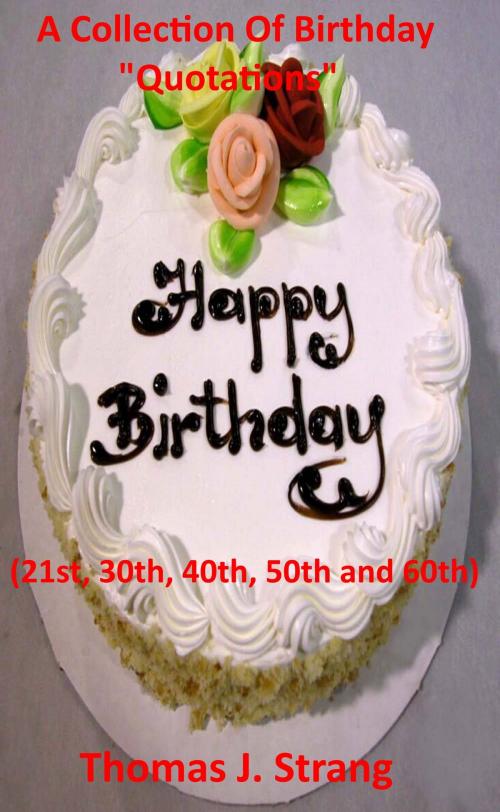A Collection Of Birthday “Quotations“
Nonfiction, Reference & Language, Reference, Almanacs & Trivia, Curiosities & Wonders, Health & Well Being, Self Help, Self Improvement, Motivational| Author: | Thomas J. Strang | ISBN: | 9781311875730 |
| Publisher: | Thomas J. Strang | Publication: | January 5, 2015 |
| Imprint: | Smashwords Edition | Language: | English |
| Author: | Thomas J. Strang |
| ISBN: | 9781311875730 |
| Publisher: | Thomas J. Strang |
| Publication: | January 5, 2015 |
| Imprint: | Smashwords Edition |
| Language: | English |
In most legal systems, one becomes designated as an adult on a particular birthday (usually between 12 and 21), and reaching age-specific milestones confers particular rights and responsibilities. At certain ages, one may become eligible to leave full-time education, or become subject to military conscription or to enlist in the military, to consent to sexual intercourse, to marry, to marry without parental consent, to vote, to run for elected office, to legally purchase (or consume) alcohol and tobacco products, to purchase lottery tickets, or to obtain a driver's license. The age of majority is the age when minors cease to legally be considered children and assume control over their persons, actions, and decisions, thereby terminating the legal control and legal responsibilities of their parents or guardian over and for them. Most countries set majority between 18 to 21.
Many cultures have one or more coming of age birthdays:
Little girl in traditional birthday hat used in Canada and the U.S.
Jewish boys become bar mitzvah on their 13th birthday. Jewish girls become bat mitzvah on their 12th birthday, or sometimes on their 13th birthday in Reform and Conservative Judaism. This marks the transition where they become obligated in commandments of which they were previously exempted and are counted as part of the community.
In Canada and the United States, families often mark a girl's 16th birthday with a "sweet sixteen" celebration.
In some Hispanic countries, as well as in Portuguese-speaking Brazil, the quinceanera (Spanish) or festa de quinze anos (Portuguese) celebration traditionally marks a girl's 15th birthday.
In India, on a child's first birthday, their head is shaved while being held by a special fire. Removal of the hair cleanses the child of any evil in past lives, symbolizing a renewal of the soul. Hindu male children of some castes, like Brahmins, have the 12th or 13th birthday
In most legal systems, one becomes designated as an adult on a particular birthday (usually between 12 and 21), and reaching age-specific milestones confers particular rights and responsibilities. At certain ages, one may become eligible to leave full-time education, or become subject to military conscription or to enlist in the military, to consent to sexual intercourse, to marry, to marry without parental consent, to vote, to run for elected office, to legally purchase (or consume) alcohol and tobacco products, to purchase lottery tickets, or to obtain a driver's license. The age of majority is the age when minors cease to legally be considered children and assume control over their persons, actions, and decisions, thereby terminating the legal control and legal responsibilities of their parents or guardian over and for them. Most countries set majority between 18 to 21.
Many cultures have one or more coming of age birthdays:
Little girl in traditional birthday hat used in Canada and the U.S.
Jewish boys become bar mitzvah on their 13th birthday. Jewish girls become bat mitzvah on their 12th birthday, or sometimes on their 13th birthday in Reform and Conservative Judaism. This marks the transition where they become obligated in commandments of which they were previously exempted and are counted as part of the community.
In Canada and the United States, families often mark a girl's 16th birthday with a "sweet sixteen" celebration.
In some Hispanic countries, as well as in Portuguese-speaking Brazil, the quinceanera (Spanish) or festa de quinze anos (Portuguese) celebration traditionally marks a girl's 15th birthday.
In India, on a child's first birthday, their head is shaved while being held by a special fire. Removal of the hair cleanses the child of any evil in past lives, symbolizing a renewal of the soul. Hindu male children of some castes, like Brahmins, have the 12th or 13th birthday











![Cover of the book 499 Funny and Serious Life Quotes Part 1 [001 To 499] by Thomas J. Strang](https://www.kuoky.com/images/2015/march/300x300/9781310139703-ptSV_300x.jpg)

![Cover of the book 999 Quotes For Everyday Living Part 1 [1 To 999] by Thomas J. Strang](https://www.kuoky.com/images/2014/may/300x300/9781311282798-78cz_300x.jpg)

